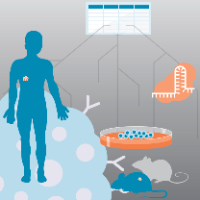Agonistic antibodies targeting 4-1BB for cancer immunotherapy
Immuno-Oncology Insights 2022; 3(8), 453–477
DOI: 10.18609/ioi.2022.049
Immune checkpoint inhibitor (ICI) – based cancer therapies have transformed the treatment landscape for many cancers. It has become a new standard of care for several cancers as a single agent treatment or in combination with other therapeutic agents. However, many patients do not respond to ICI-based therapies or develop resistance and relapse. Thus, developing a novel therapeutic agent to increase objective response rate and address resistance to immune ICIs, as a monotherapy or combined with ICI therapies, is an urgent unmet need. Co-stimulatory immune receptors are functionally distinct from the co-inhibitory receptors targeted by the ICI-based therapies. As co-stimulatory immunoreceptors are one pillar regulating immune responses of T cells, therapies targeting these receptors have the potential to complement and synergize the effects of currently available ICI therapies. 4-1BB (CD137, TNFRSF9) is a compelling target among T cell co-stimulatory immunoreceptors. Preclinical data using mouse- or human-specific anti-4-1BB agonist antibodies have accumulated a persuasive dataset that activation of the 4-1BB co-stimulatory pathway significantly inhibited tumor growth and prolonged survival either as a single agent or in combination with ICIs. Encouraged by these data, two 4-1BB agonist antibodies, urelumab and utomilumab, have been tested in clinical trials. However, results from these early clinical trials were disappointing as urelumab and utomilumab revealed their limitations; urelumab exhibited severe hepatotoxicity with signs of clinical activity, and utomilumab displayed limited efficacy with a better safety profile. These early clinical experiences have helped to formulate strategies how to generate the next generation of the 4-1BB agonist antibodies. Current developments of 4-1BB agonist antibodies are multifaceted, but the overarching theme is how to develop a potent 4-1BB agonist without toxicity. In this review, we will provide an overview of the seminal studies that contributed to the current understanding of the mouse or human 4-1BB-specific agonist antibodies, focusing on how they were developed and characterized in vitro and evaluated in mouse preclinical cancer models in vivo. Moreover, we will discuss the landscape of the 4-1BB targeting agonist antibodies in clinical development, covering monospecific and bispecific antibodies. Furthermore, we will discuss strategies to mitigate liver toxicity often associated with 4-1BB agonist antibodies. Lastly, we will discuss how the safety and pharmacokinetics/pharmacodynamics (PK/PD) of 4-1BB agonist antibodies were measured using non-human primates.
